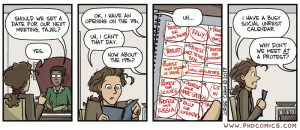Tuesday, February 21st, 2017...2:08 pm
The (Hidden) Benefits of On-Campus Involvement
Guest Post: Chris Kelleher, PhD Candidate, Department of English
Few graduate students today are willing to entertain the notion of “more”: more work, more responsibility, more deadlines, or simply more to do. “More” is impractical, implausible, and oftentimes, impossible. For many across the disciplinary spectrum, if the immense workloads of research and teaching were not enough, grant applications and funding proposals are overloading the proverbial plates of many graduate students. And rightly so. These are the hallmark activities of higher education and the bedrock of leading research. They are also most crucial to pursuing careers, especially in academia. But this list does not even count the many balancing acts taking place outside of the university, where students try to maintain semblances of a personal, social, or working life. Many of these students have families to support as well. Finally, and at the risk of belabouring the point, let’s not forget too that “Grad Burnout” is both a very real phenomenon, and something to be actively avoided. In short, graduate students are very busy people. And so, it should come as little surprise when any talk of adding “more” to one’s graduate studies is usually met, at best, with polite laughter.
And yet, there are two myths to this all-too-common narrative worth dispelling. First, is the underlying belief in the chronic scarcity of time. In a widely circulated May 2016 piece from the New York Times, provocatively entitled, “The Busy Person’s Lies,” Laura Vanderkam outlines the perennial tendencies of working individuals both to underestimate the amount of time they have to complete tasks, and to overestimate the amount of time spent working. When asked to monitor, down to the minute, the amount of time individuals spent on various tasks throughout the day, participants in several studies tended to uncover more time in the day than their stressed minds initially allowed for. As Vanderkam writes, “By showing us that we do, in fact, have the privilege of free time, time tracking also nudges us to make wiser choices about how to spend it.”
Of course, taken to its extreme, time tracking may either open the door to a horrific, Benthamite maximization of each moment’s work potential, or, as this throwback from The Office illustrates, a risible exercise in “efficiency” that wastes just as much time as it creates:
https://www.youtube.com/watch?v=HGMe_ymho90
So now that you’ve potentially discovered more time in your schedule, how best to spend it?
(Source: http://phdcomics.com/comics/archive.php?comicid=1920)
The second myth worth debunking from the above narrative of graduate students and time is the notion that extra-curricular involvement is somehow a distraction from graduate work, or that it indicates a lack of commitment to a particular field of study. In fact, both off- and on-campus involvement may be one of the most productive and personally rewarding ways to divert your time. Apart from providing a mental reprieve and a more diverse set of experiences, both types of involvement confer a variety of benefits. On-campus involvement, however, can be particularly worthwhile precisely because it often falls within the “Three Pillars” of academic professional development:
- Research
- Teaching
- Service
Having worked in several departmental and administrative roles related to promotion, tenure, and hiring, I can say with certainty that it is becoming increasingly important, even at the graduate level, for prospective faculty to demonstrate experience in on-campus forms of “service.” “Perfect,” you might say in frustration, “one more hoop to jump through on my way to completing a doctorate.” Perhaps, it is. But make no mistake, this is no arbitrary invention of evil hiring committees. Across today’s shifting landscape of higher education, even fully tenured professors are being asked to do more in the way of administrative work for universities in order to maintain their positions. Individuals who can bring a working knowledge of bureaucratic structure, and some experience of working with others on an administrative plane can prove themselves to be a great asset during the hiring process.
What’s more, is that often the work itself can be quite engaging. Opportunities in student programming, for instance, can allow you to work with, and directly benefit, other graduate students, often from a variety of other disciplines and departments. In many cases, these opportunities can impart invaluable experience in launching your own initiatives. Administrative opportunities, by contrast, can allow you to network with important figures on the managerial side of the university while allowing you to learn how the crucial machinery of a great university actually works.
What on-campus involvement opportunities are available for graduate students? There are plenty. Some examples include: your own department; your own graduate unit, or student association; The Graduate Student Union (GSU); and, the Grad Room. There are also many graduate student clubs and internship possibilities. Gradlife, a central resource for graduate students at U of T, may introduce you to many more, but they also lead Grad Escapes, a diverse array of social events that include outings to cooking classes, trivia nights, winter markets, ball games, and art studios.
These are but just a few places to consider, and which may, after all, introduce you to the many possibilities of more.
Chris Kelleher is a PhD Candidate in the Department of English, Chancellor Jackman Junior Fellow, and a Junior Fellow at Massey College at the University of Toronto, as well as a Community Animator at the Grad Room.


Leave a Reply